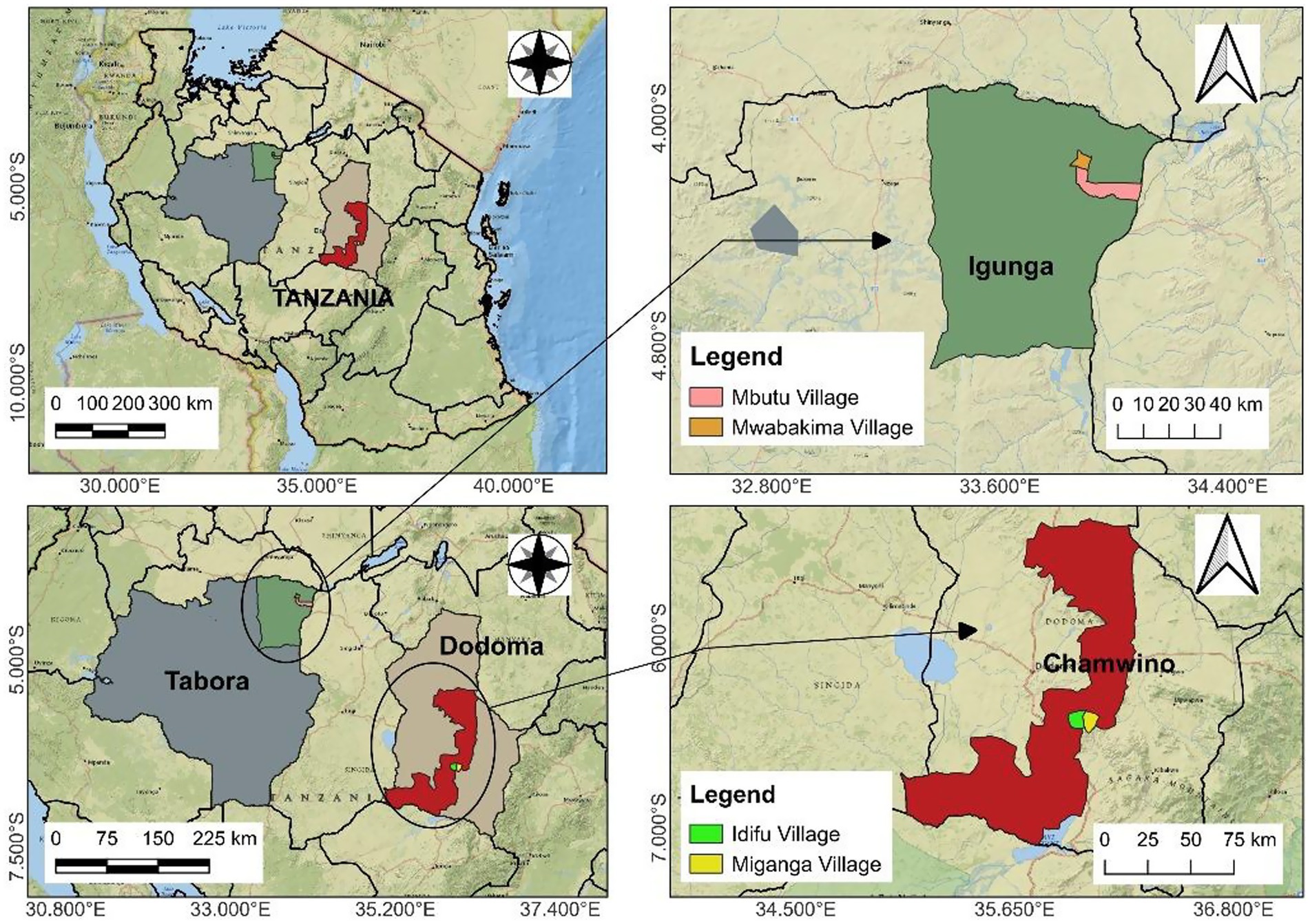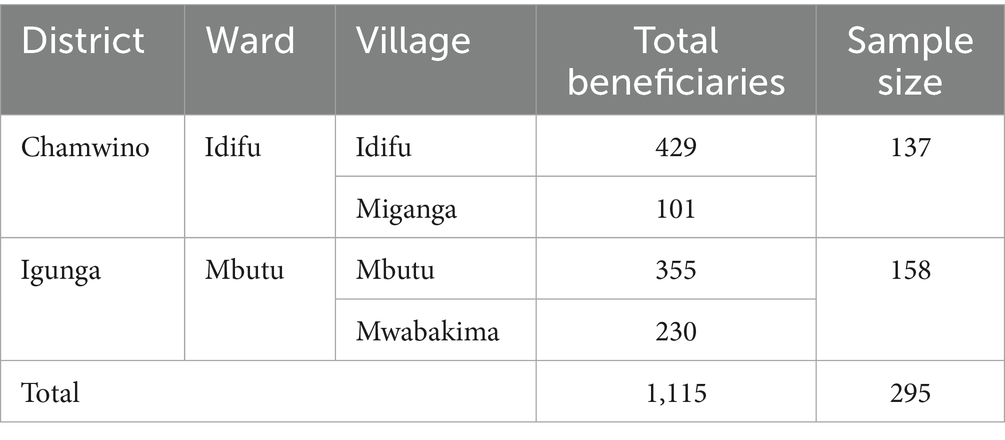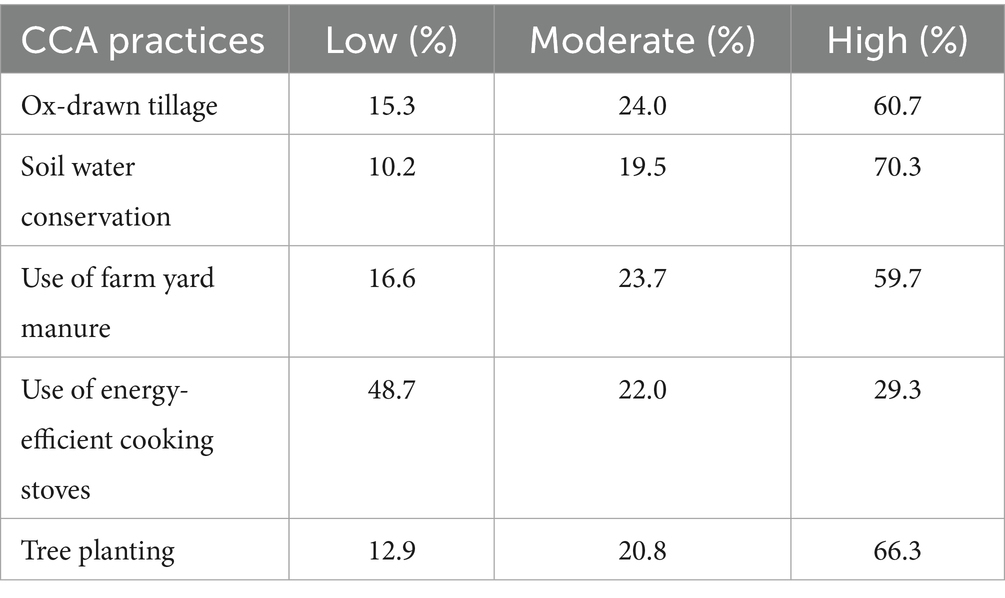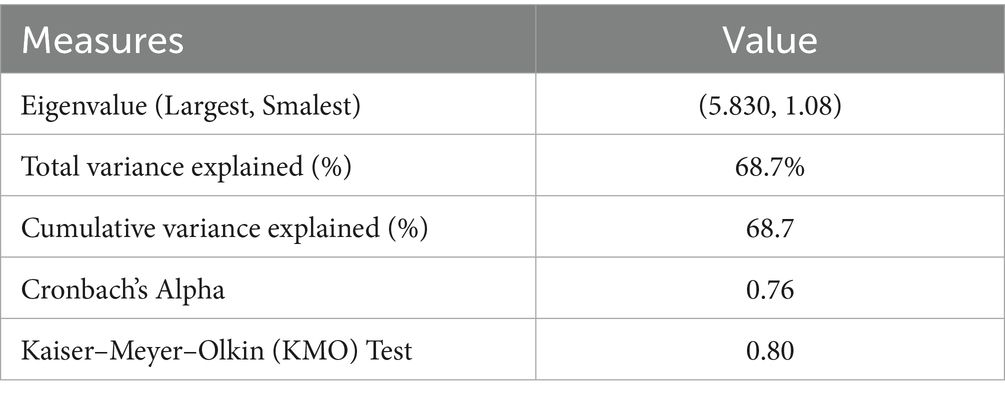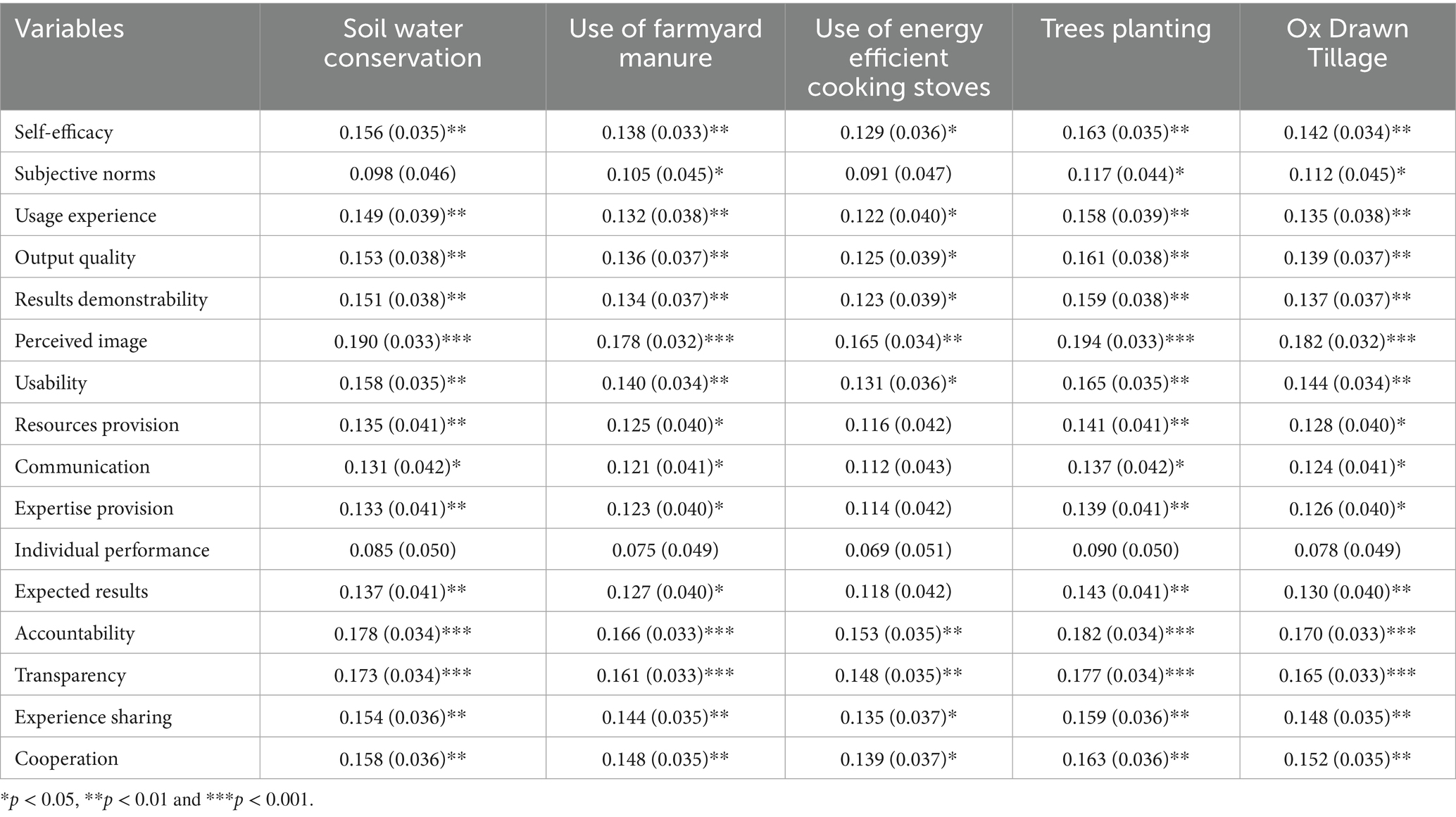- 1Institute of Development Studies (IDS), The University of Dodoma, Dodoma, Tanzania
- 2Department of Development and Strategic Studies (DDSS), Sokoine University of Agriculture, Morogoro, Tanzania
Climate change impacts have driven initiatives like eco-village projects to implement Climate Change Adaptation (CCA) practices in vulnerable communities. However, their sustainability post-funding is uncertain. This study investigates how Relative User Satisfaction (RUS) and Critical Success Factors (CSF) influence CCA practice sustainability in Chamwino and Igunga agro-ecological zones, Tanzania. Using the Technology Acceptance Model (TAM) and Pinto’s Project Success Theory, we assessed RUS and CSFs’ comparative effects on sustainability. Data from 295 respondents implementing CCA practices were collected via using household surveys, Key Informant Interviews, and focus group discussion. Polychoric correlations, Multiple Correspondence Analysis, and multivariate ordered logit modeling evaluated sustainability (low, medium, high). Soil water conservation showed the highest sustainability (70.3%), followed by tree planting (66.3%), while energy-efficient cooking stoves had the lowest (48.7%). Strong correlations existed between soil water conservation, ox-drawn tillage, and tree planting (p < 0.001), with weaker correlations for energy-efficient stoves (p < 0.01). Perceived Image strongly influenced sustainability (β = 0.912–1.198, p < 0.001), especially for tree planting, followed by Accountability (β = 0.876–1.152, p < 0.001) and Transparency (β = 0.567–0.784, p < 0.01). Self-efficacy (β = 0.567–0.912, p < 0.05) and Usability (β = 0.645–0.812, p < 0.001) also impacted sustainability, while Individual Performance had minimal effect. CSFs like Self-efficacy, Perceived Image, Accountability, and Transparency increased sustainability probability by 16.5–19.4%. Low sustainability reflects social and governance barriers. RUS and CSF significantly influenced CCA practice sustainability, enhancing resilience through user perceptions and institutional support. Policymakers should integrate RUS and CSFs into CCA strategies, prioritizing community engagement, institutional support, and targeted interventions like subsidies and training to enhance post-funding sustainability. These findings highlight the critical role of user-focused governance in sustaining CCA practices long-term.
1 Introduction
Climate change poses a serious challenge to economic development, with the nature and type of development having implications for society to climate change impacts (Agrawala et al., 2012). Human-induced climate variation is reshaping ecosystems, economies, and societies worldwide, with profound impacts on livelihoods, food security, and biodiversity (Intergovernmental Panel on Climate Change, 2022). Globally, rising temperatures, extreme weather events, and sea-level rise threaten communities, agriculture, and infrastructure, disproportionately affecting vulnerable populations (World Bank, 2023). In Africa, the impacts are amplified due to high dependence on rain-fed agriculture, limited adaptive capacity, and socio-economic challenges, with 75% of the most affected populations residing in rural areas (African Development Bank Group, 2025). The continent faces exacerbating poverty and displacement due to a decline in crop yields from 15 to 35% in some regions, water scarcity, and increased frequency of droughts and floods (Serdeczny et al., 2016).
Tanzania has already been experiencing real and visible impacts of climate change; by 2,100, mean annual temperatures are projected to increase by approximately 2–4 °C across many zones of the country, with some regions (western, highlands, northern coast) expected to warm by up to 3.3–3.4 °C under high emissions scenarios (United Republic of Tanzania, URT, 2023; UNIQUE Forestry and Land Use, 2020). Climate projections indicate that northern and southern parts of the country would experience an increase in rainfall ranging from 5 to 45% and that most parts of the country might experience a decrease in rainfall of 10–15% (Mwandosya et al., 1998). The major observed impacts of climate change include severe floods, frequent and prolonged droughts, rising sea levels, crop failure, loss of livestock, lower water availability and quality and an increase in vector and water-borne diseases (Githeko et al., 2000; Patz et al., 2005). Heavy rains, floods, drought and landslides in Tanzania have resulted in internal displacement, food shortages and increased disease transmissions. Vulnerability to climate change is prolonged through deforestation and biomass degradation, impacting over 90% of wood fuel-dependent households (Komba and Muchapondwa, 2018).
As the effects of climate change continue to be tangible, there has been a demand for proper and integrated actions (Pielke et al., 2007; Klein, 2011) to help the affected communities. Different actions have been employed all over the world, based on mitigation, to prevent greenhouse gas (GHG) emissions or reduce their atmospheric concentration, or adaptation to adjust to actual or expected climate and its effects (Field and Barros, 2014). Adaptation to climate change is at the intersection of science, communities and decision-making, with different spatial and temporal scales (Scarlett, 2011), and is influenced by social issues, financial resources, political context, public awareness, politicization of climate change or scientific uncertainty (Carlson and McCormick, 2015).
Efforts to address climate change impacts in Tanzania have included mitigation to reduce greenhouse gas emissions and adaptation to adjust to changing conditions (Field and Barros, 2014). Since 2011, Tanzania has implemented CCA practices through eco-village projects supported by donors like the European Union and AGRA, focusing on agriculture, water, and energy sectors (Kunze and Avelino, 2015). However, empirical evidence reveals a critical challenge, whereby the sustainability of CCA practices often declines within 3–5 years post-funding. A significant research gap exists in understanding the factors driving the long-term sustainability of CCA practices in specific agro-ecological contexts, as sustainability hinges on aligning interventions with community needs, capacities, and external support structures (Mngomezulu et al., 2023; Mdoe and Kilawi, 2024). Existing studies have been focusing on immediate adoption or short-term outcomes of CCA interventions, with limited attention to their sustained implementation beyond external funding. For instance, while frameworks like the Technology Acceptance (TAM; Davis, 1989) highlight user satisfaction through perceived ease of use and usefulness as critical to adoption they fall short in explaining how these perceptions interact with project governance factors to ensure longevity. Similarly, Pintos Project Success Theory identifies Critical Success Factors (CSFs) such as accountability, transparency, and community engagement as essential for project success (Agyekum et al., 2024), yet its application to CCA sustained implementation remains underexplored. The interplay between RUS and CSFs has not been systematically examined in the context of Tanzanias agro-ecological zones, creating a theoretical gap in understanding how they interact in influencing CCA practices sustainability.
This study addresses the identified gaps by investigating the interplay of RUS and CSFs in sustainability of CCA practices in Chamwino and Igunga eco-villages, Tanzania. Empirically the study evaluates drivers of CCA practice’s sustainability 5 years post-funding, providing evidence on their long-term viability. Theoretically the study integrates Technology Acceptance Model (TAM) and Pintos Theory of Project Success to develop a new framework for analyzing the combined influence of user perceptions and governance factors on CCA sustainability. The study also provides context-specific insights into Tanzanias agro-ecological zones, informing scalable strategies for resilient adaptation.
The main objective of this study is to evaluate how RUS and CSFs shape the sustained implementation of these CCA practices, addressing a gap in understanding their long-term viability in specific agro-ecological contexts. The research questions guiding this study are: (1) To what extent are CCA practices are sustainable in Chamwino and Igunga after funding? (2) What interdependencies exist among the CCA practices? (3) How do RUS and CSFs influence sustainability of CCA practices?
Sustainability in this study is pinned on the continued implementation of CCA practices by beneficiaries 5 years after external funding ends (Mahonge, 2013; Scheirer and Dearing, 2011). Khalifeh et al. (2023) distinguish between project product sustainability (sustained outcomes like improved agricultural yields) and project process sustainability (ongoing management and activities). Studies, such as Hoque et al. (1996) on water and sanitation practices in Bangladesh, show that user acceptance significantly enhances sustainability post-implementation, while Pollnac and Pomeroy (2005) found that community perceptions of benefits drive continued engagement in coastal management projects. Sustainability is thus contingent on aligning interventions with community needs, capacities, and external support structures (Scheirer and Dearing, 2011).
The findings of this study aims to guide inclusive policy frameworks and extension strategies that enhance community resilience against escalating climate challenges. By identifying actionable strategies to ensure the sustainability of CCA practices, this study contributes to sustainable development in Tanzania’s agro-ecological zones. It provides evidence-based insights for donors, governments, and communities to design interventions that align with local capacities and needs, thereby reducing the risk of post-funding decline. Ultimately, the study seeks to advance the global discourse on climate adaptation by demonstrating how user satisfaction and project governance can be leveraged to sustain CCA practices in resource-constrained settings.
1.1 Theoretical framework
This study lays its theoretical foundation on the Technology Acceptance Model (TAM) and Pinto’s theory of Project Success, to examine the influence of Relative User Satisfaction (RUS) and Critical Success Factors (CSFs) on the sustainability of Climate Change Adaptation (CCA) practices in Chamwino and Igunga, Tanzania. These theories provide a strong framework to assess how user perceptions and project management factors drive the sustained implementation of practices like tree planting, soil water conservation, and energy-efficient cooking stoves.
The TAM, developed by Davis (1989), assumes that user adoption and sustained use of technologies or practices depend on two core constructs: perceived usefulness (the belief that a practice enhances performance) and perceived ease of use (the belief that a practice is effortless to implement). These perceptions shape RUS, influencing long-term engagement. In this study, RUS is operationalized through proxy indicators such as self-efficacy, subjective norms, usage experience, perceived risks, output quality, results demonstrability, perceived image, compatibility, usability, and relevance, which collectively determine community acceptance and continuation of CCA practices. Whilst Pinto’s Project Success Theory, developed by Pinto and Slevin (1987), assumes that project success hinges on internal (project management) and external (stakeholder engagement) factors. Key CSFs include top management support (resource provision, communication, and expert guidance) and monitoring and feedback (systematic tracking and actionable feedback). These factors ensure alignment with project goals and stakeholder needs, fostering sustainability. In this study, CSFs are operationalized through accountability, transparency, resource provision, and community-based monitoring and evaluation (M&E) frameworks, which support the sustained implementation of CCA practices post-funding.
TAM has been criticized for its narrow focus on individual perceptions, often overlooking contextual factors like socio-economic constraints or cultural influences, which are critical in developing countries (Venkatesh and Bala, 2008). For instance, in rural Tanzania, limited access to resources or education may undermine perceived ease of use, limiting TAM’s explanatory power. Additionally, TAM may not fully capture the long-term dynamics of sustainability, as it primarily focuses on initial adoption (Bagozzi, 2007). While Pinto’s Project Success Theory is critiqued for its project-centric perspective, which may underemphasize community-driven factors in sustainability (Ika et al., 2012). Critics argue that its emphasis on top-down management (e.g., top management support) can marginalize grassroots participation, particularly in donor-funded projects where external priorities may conflict with local needs (Agyekum et al., 2024). Furthermore, the theory’s broad CSFs may lack specificity for context-specific challenges, such as governance barriers in agro-ecological zones.
Despite these critiques, TAM and Pinto’s Project Success Theory remain highly relevant for analyzing the sustainability of CCA practices in Chamwino and Igunga. TAM’s focus on RUS, particularly through factors such as perceived image, self-efficacy and usability, explaining why practices like tree planting, soil water conservation and others sustain after funding, as communities perceive tangible benefits and ease of implementation (Oguntuase et al., 2023). These findings align with TAM’s assumption that user satisfaction drives sustained engagement, despite socio-economic barriers reducing the sustainability of practices.
Pinto’s theory complements TAM by highlighting CSFs like accountability and transparency, which significantly enhance sustainability. These factors underscore the importance of governance and community engagement, aligning with Pinto’s emphasis on stakeholder coordination and feedback (Pinto and Prescott, 1988). For instance, strong community-based M&E frameworks supported sustained soil water conservation, while weak governance contributed to lower sustainability of energy-efficient stoves. By integrating TAM and Pinto’s theory, this study reveals how RUS and CSFs interact to address social and governance barriers, providing actionable insights for policymakers to design resilient CCA strategies.
1.2 Conceptual framework
The conceptual framework presented in Figure 1 integrates Relative User Satisfaction (RUS) indicators and Critical Success Factors (CSFs) with the sustainability of Climate Change Adaptation (CCA) practices. In this study, sustainability the dependent variable is defined as the continued implementation of CCA practices, such as tree planting, the use of farmyard manure, ox-drawn tillage, soil and water conservation, and energy-efficient cooking stoves, 5 years after the cessation of donor funding (Mahonge, 2013). Relative Users Satisfaction is derived from TAM, with indicators such as Self-Efficacy, Subjective Norms, Usage Experience, Output Quality, Results Demonstrability, Perceived Image and Usability. Critical Success Factors are derived from Pinto’s theory of project success with Resources provision, Communication, Experts provision, Individual Performance, Expected results, Accountability, Transparency, Experience sharing and Cooperation. This framework posits that RUS and CSFs interact to create an enabling environment for sustained implementation of CCA practice, addressing social and governance barriers identified in the study. By combining TAM’s user-centric focus with Pinto’s governance-oriented factors, the framework provides a comprehensive lens to explain determinants of CCA practices sustainability.
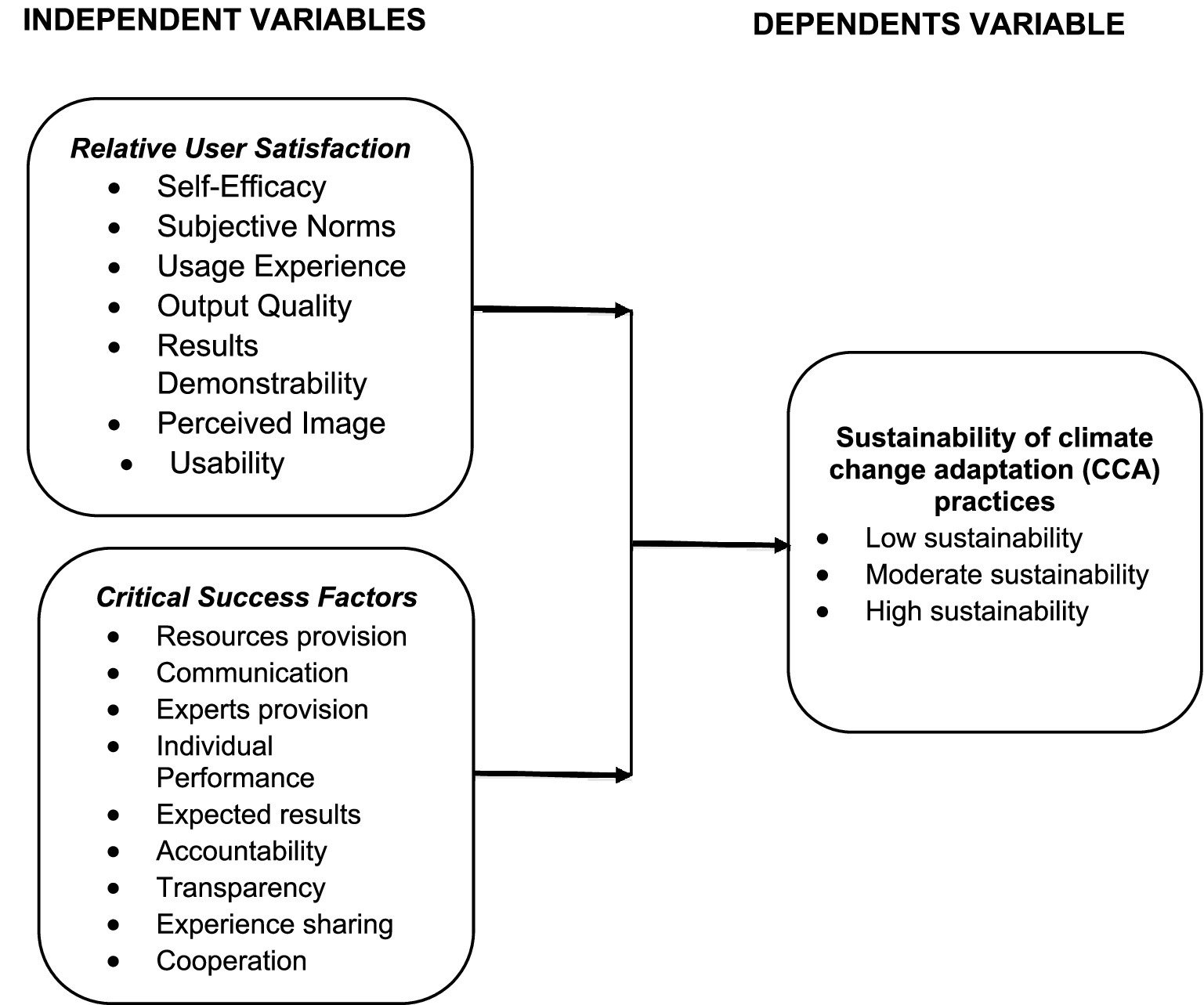
Figure 1. Conceptual framework indicating the combined linkage between relative users satisfaction and critical success factors toward sustainability of CCA practices.
2 Methodology
2.1 Study design and area
This study adopted a cross-sectional research design to investigate the influence of Relative Users Satisfaction (RUS) and Critical Success Factors (CSFs) on the sustainability of Climate Change Adaptation (CCA) practices. The design was selected due to its ability to allow collection of data at a single point in time, while providing a logical structure for capturing complex phenomena across diverse populations (Van Valkengoed et al., 2021; Dubash and Jogesh, 2021). This design enabled efficient collection of both qualitative and quantitative data for the study within a specified period of time.
Chamwino and Igunga districts were purposively selected as case studies due to their involvement in eco-village projects between 2015 to 2019. The eco-village projects were ECO-ACT (Eco-Adaptation to Climate Change in Central Tanzania) and IACCA (Integrated Approaches for Climate Change Adaptation). These districts, located in central and western Tanzania represent two agro-ecological zones vulnerable to climate change impacts, such as droughts and erratic rainfall, making them ideal for studying CCA sustainability (Mwandosya et al., 1998). The attached Figure 2 is a Map illustrating study areas positions within Tanzania: Chamwino in Dodoma Region (central plateau) and Igunga in Tabora Region (western plateau). The map highlights study villages which are Idifu and Miganga in Chamwino, and Mbutu and Mwabakima in Igunga. Both districts represent Tanzania’s rain-fed agricultural systems, where over 70% of the population depends on farming, making them ideal for examining post-funding sustainability amid climate variability.
2.2 Sampling processes
This study employed a mixed sampling strategy to select household beneficiaries who actively participated in implementing CCA practices within the study area. Purposive sampling was used to identify households based which adopted and implemented CCA practices, such as tree planting, soil water conservation, and energy-efficient cooking stoves, during and after the funding. This approach ensured that only respondents with direct experience in CCA practices were included, enhancing the relevance of data to the study’s focus on sustainability, RUS, and CSFs (Ali and Erenstein, 2016).
To determine the sample size, Cochran’s formula (Cochran, 1977) was applied for random sampling within the purposively selected population, yielding a sample of 295 households from a total of 1,115 beneficiary households across four villages (Idifu, Miganga, Mbutu, and Mwabakima). The formula is:
where:
n is the sample size,
N is the total number of beneficiary households in the four villages (1,115),
e is the level of precision (0.05),
p is the sample proportion (0.5),
q is 1−p,
z is the z-value for the confidence level given (1.96 for 95% confidence).
The sample was proportionally distributed across the villages based on their beneficiary populations: 137 respondents from Chamwino District (Idifu: 429 beneficiaries, Miganga: 101 beneficiaries) and 158 respondents from Igunga District (Mbutu: 355 beneficiaries, Mwabakima: 230 beneficiaries), as shown in Table 1. This proportional allocation ensured representative coverage of diverse agro-ecological contexts and implementation experiences, supporting strong analysis of sustainability variations.
2.3 Data collection methods and instruments
This study employed a mixed-methods approach, integrating qualitative and quantitative data collection to ensure strong findings through triangulation and to facilitate generalizable insights into the sustainability of CCA practices in Chamwino and Igunga, Tanzania. The combination of methods allowed for a wide analysis of RUS and CSFs, capturing both statistical trends and nuanced community (Ali and Erenstein, 2016). Data collection occurred from November 2023 to January 2024, targeting households and stakeholders involved in the ECO-ACT and IACCA eco-village projects (2015–2019). A structured household survey was administered to 295 purposively selected beneficiaries who actively implemented CCA practices, such as tree planting, soil water conservation, and energy-efficient cooking stoves. The survey instrument was pre-tested with 30 respondents in Chololo eco-village, Dodoma region, to ensure clarity, relevance, reliability, and validity, with adjustments made to improve question precision and respondent comprehension. The survey collected data on sustainability levels and RUS indicators like perceived ease of use and usefulness. Secondary data, including project reports and climate adaptation records, were sourced from relevant websites (e.g., ECO-ACT and IACCA archives) and local government offices in Chamwino and Igunga to complement primary data and contextualize findings.
To gain in-depth insights into the implementation and sustainability of CCA practices, four Focus Group Discussions (FGDs) were conducted, each involving 10 purposively selected participants from the villages of Idifu, Miganga, Mbutu, and Mwabakima. These FGDs explored community perceptions of CSFs, such as accountability and transparency, which influenced sustainability. Additionally, 10 Key Informant Interviews (KIIs) were conducted with six local government representatives (ward extension officers and political leaders), two project implementers (from the Institute of Rural Development Planning in Dodoma and Heifer International in Igunga), and two NGO representatives. These interviews provided expert perspectives on governance, resource provision, and barriers to sustained adoption, enriching the qualitative analysis.
2.4 Data processing and analysis
The data collected from household surveys, focus group discussions, and key informant interviews in Chamwino and Igunga, Tanzania, were processed and analyzed using Stata software (version 18) to evaluate the sustainability of Climate Change Adaptation (CCA) practices post-funding (2015–2019). Descriptive statistics, including frequencies and percentages, characterized the extent of CCA practice implementation, while inferential statistics tested the significance of relationships between variables, such as Relative User Satisfaction (RUS) and Critical Success Factors (CSFs), and their impact on sustainability. The mixed-methods approach ensured robust analysis by triangulating quantitative trends with qualitative insights on governance and user perceptions. The analysis was structured into three key components: assessing sustainability levels, examining interdependencies among practices, and evaluating the influence of RUS and CSFs on long-term adoption.
Descriptive analysis was used to quantify the sustainability of CCA practices—tree planting, soil water conservation, farmyard manure use, ox-drawn tillage, and energy-efficient cooking stoves, 5 years post-funding. Implementation extent was categorized as Low (1), Moderate (2), or High (3) based on frequency and percentage distributions. Polychoric Correlation analysis (r) was performed to determine the relationship among CCA practices. Polychoric correlations is suitable for estimating the association between latent continuous variables with ordinal scale nature (1 = Low, 2 = Moderate, 3 = High) underlying the ordinal responses, hence providing a robust measure for non-normal data (Nguyen et al., 2016). To ensure validity and reduce redundancy of the RUS and CSFs constructs, Multiple Correspondence Analysis (MCA) was conducted, resulting to selection of final ten variables after a good score of Cronbach’s Alpha > 0.7. To determine the extent to which one unit change in RUS and CSF constructs influence the change in implementation of CCA practices, the Marginal effects (dy/dx) analyisis was conducted. Marginal effect analysis is proven to be suitable on determining how the dependent variables change in response to changes in the independent attributes (Perraillon et al., 2019).
The marginal effects (dy/dx) were computed as follows:
where represents the probability density function of the normal distribution.
2.4.1 Multivariate ordered logit model
Multivariate Ordered Logit Model was used to determine the influence of CSFs and RUS on sustainability of Climate Change adaptation practices. Ordered probit model is suitable when the dependent variable has more than two categories with a meaning (McKelvey and Zavoina, 1975). Ordered progression refers to the situation in which each category represents a level of intensity or importance higher than the previous one. The model was employed in this study because sustainability is measured on 3 continuum of Low (Score 1), medium (Score 2) and high (Score 3) for multiple CCA practices to generate the dependent variable.
Since sustainability is an ordinal variable, the ordered logit model was used to identify the factors (independent variables) like Top Management, Provision of resources, Provision of experts, Self-efficacy, Subjective norms, Usage experience, Perceived risks, Output quality, Results demonstrability, Perceived image, Compatibility, Usability and Relevance toward sustainability of CCA practices
Where:
• ∗: Latent continuous propensity for sustainability of practice k
• X: Vector of independent variables (CSFs, RUS, controls).
• βk: Vector of coefficients for practice k k k, capturing the effect of each predictor.
• ϵk: Logistic error term with variance π2/3 correlated across practices
The sustainability levels were categorized as follows:
3 Findings and discussion
3.1 Sustainability extent of climate change adaptation practices across the zones after funding
The sustainability of Climate Change Adaptation (CCA) practices in Chamwino and Igunga, Tanzania was assessed by evaluating the extent of their continued implementation 5 years after the funding period of the ECO-ACT and IACCA eco-village projects. Findings from the study indicated sustainability in implementation of CCA practices as indicated on Table 2. Soil water conservation exhibited the highest sustainability, with 70.3% of respondents rating it as high, followed by tree planting at 66.3%. Ox-drawn tillage and use of farm yard manure also showed strong sustainability, with 60.7 and 59.7% rated high, respectively. Conversely, the use of energy-efficient cooking stoves had the lowest sustainability, with 48.7% rated low and only 29.3% rated high. Moderate sustainability was reported across all practices, ranging from 19.5% for soil water conservation to 24.0% for ox-drawn tillage. These findings indicate that while most CCA practices are perceived as highly sustainable, other practices need targeted interventions to enhance their sustainability. The high sustainability of soil water conservation and tree planting practices reflects their affordability and alignment with local context, as low-cost interventions are more likely to persist post-funding. The practices are also well known for enhancing soil moisture and environmental stability, supporting long-term resilience. Moderate sustainability of practices such as the use of farmyard manure suggests partial alignment with local resources but potential limitations in availability or knowledge, while the low sustainability of energy-efficient cooking stoves indicates technology, financial and cultural setbacks.
These findings align with various studies, including Nguyen et al. (2016), in which low-cost practices, such as soil conservation and agroforestry, were found more likely to be sustained post-funding due to their affordability. In contrast, low sustainability of energy-efficient cooking stoves faced barriers, including high maintenance costs and cultural preferences for traditional cooking methods, which hindered adoption (Mdoe and Kilawi, 2024). The findings suggest that practices requiring minimal financial investment and cultural compatibility achieve higher sustainability, while technological interventions need tailored support to overcome economic and social constraints.
3.2 Interdependence in the implementation of climate change adaptation practices
The interdependence among Climate Change Adaptation (CCA) practices in Chamwino and Igunga, agro-ecological zones was analyzed to understand synergistic relationships influencing their sustainability, 5 years after the funding period. Polychoric correlation analysis results in Table 3 revealed significant interdependencies among the five Climate Change Adaptation (CCA). Strongest correlations were observed between soil water conservation and ox-drawn tillage (r = 0.452, p < 0.001) and tree planting (r = 0.438, p < 0.001), indicating robust interdependence among soil management and agroforestry practices. The use of farmyard manure showed significant correlations with soil water conservation (r = 0.419, p < 0.001) and tree planting (r = 0.364, p < 0.001), while energy-efficient cooking stoves exhibited the weakest correlations with other practices ranging between (r = 0.241–0.297, p < 0.01).
The strong correlations between soil water conservation, ox-drawn tillage, and tree planting indicate synergistic relationships that enhance climate resilience by improving soil moisture, structure, and agricultural productivity. These findings align with a study by Nguyen et al. (2016) in which practices enhancing soil moisture and structure complement agroforestry efforts for climate resilience. The observed correlations among soil-based and agroforestry practices suggest complementary perception, enhancing sustained implementation through shared benefits like improved soil fertility and reduced erosion (Berrang-Ford et al., 2011). The weaker correlations for energy-efficient cooking stoves reflect limited interdependence, with technological and cultural barriers, such as high maintenance costs and misalignment with local cooking preferences (Mdoe and Kilawi, 2024). This weak correlation highlights the need for targeted policies to foster collaboration and integration with other practices, such as energy and agroforestry, while enhancing cultural compatibility and reducing maintenance barriers.
These observed interdependencies among practices suggest to Policymakers to prioritize strategies that promote synergistic implementation, while addressing technological and social constraints to ensure long-term sustainability in resource-constrained agro-ecological zones (Agyekum et al., 2024).
3.3 Association among the RUS and CSF factors constructs
The study utilized Multiple Correspondence Analysis (MCA) to assess the associations and reduce dimensionality among Relative User Satisfaction (RUS) and Critical Success Factors (CSFs) constructs. The MCA results on Table 4 confirmed the suitability of the data, with a Kaiser-Meyer-Olkin (KMO) value of 0.80 indicating adequate sampling and a Cronbach’s alpha of 0.76 demonstrating strong internal consistency across constructs. Two dimensions indicated on Table 5 explained 68.7% of the cumulative variance (eigenvalues: 5.830 and 1.080), effectively capturing the primary RUS and CSF constructs. Key RUS constructs, including self-efficacy (α = 0.79), perceived image (α = 0.77), and usability (α = 0.75), showed strong reliability and significant contributions to Dimension 1 (0.68–0.72) and Dimension 2 (0.46–0.51). This results align with their role in driving sustained adoption of practices like soil water conservation and tree planting. Similarly, CSF constructs such as accountability (α = 0.81), transparency (α = 0.80), and resource provision (α = 0.80) exhibited high reliability and strong associations (Dimension 1: 0.71–0.73, Dimension 2: 0.50–0.54), reflecting their impact on sustainability through governance and community engagement (Agyekum et al., 2024). Constructs like subjective norms (α = 0.69) and individual performance (α = 0.66) showed lower reliability and variance, leading to their exclusion as predictors of CCA practice sustainability post-funding.
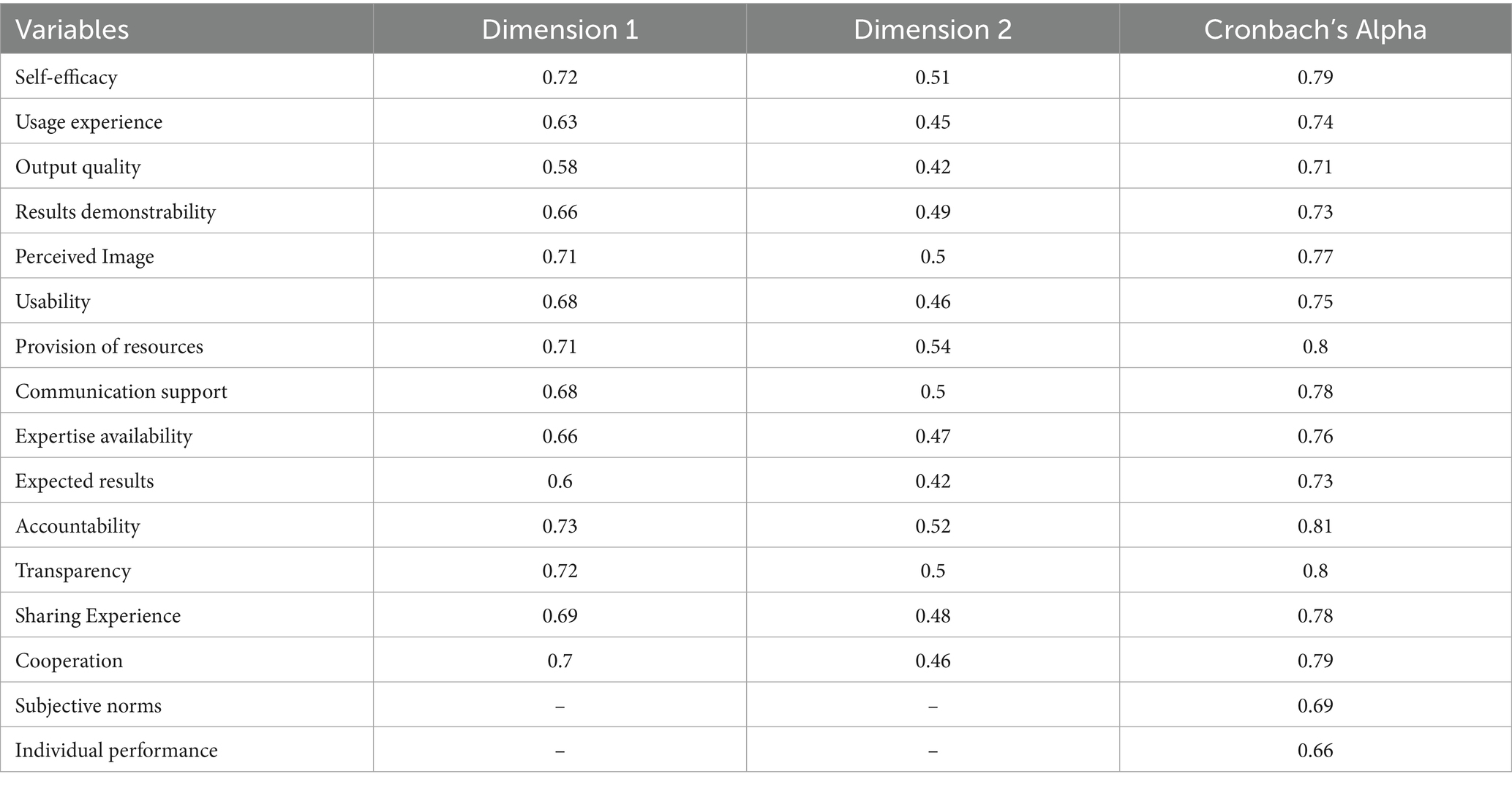
Table 4. Multiple correspondence analysis (MCA) for relative user satisfaction and critical success factors constructs.
These findings underscore the importance of user-centric factors (e.g., perceived ease of use and usefulness) and governance mechanisms in overcoming barriers, particularly for low-sustainability practices like energy-efficient cooking stoves (Mdoe and Kilawi, 2024). The exclusion of subjective norms and individual performance suggests that collective and structural factors outweigh individual influences in resource-constrained settings. These insights inform targeted interventions, such as enhancing community training to boost self-efficacy and establishing transparent governance to support sustained CCA adoption.
3.4 Influence of RUS and CSF on the sustainability of CCA practices
The influence of Relative User Satisfaction (RUS) and Critical Success Factors (CSFs) on the sustainability of Climate Change Adaptation (CCA) practices in Chamwino and Igunga was analyzed using multivariate ordered logit modeling. Results as indicated on Table 6 revealed that; both RUS and CSF significantly shaped the long-term adoption of CCA practices, 5 years after funding. Among the RUS constructs, perceived image emerged as the strongest predictor of sustainability (β = 0.912–1.198, p < 0.001), exerting the greatest effect on tree planting (β = 1.198) and soil water conservation (β = 1.176) practices which also recorded the highest sustainability rates by 66.3 and 70.3%, respectively. Other user-related factors such as self-efficacy (β = 0.567–0.912, p < 0.05) and usability (β = 0.645–0.812, p < 0.05) were also significant, particularly influencing the use of farmyard manure and ox-drawn tillage. Factors such as experience sharing, expected results, and cooperation showed moderate but significant effects (p < 0.01), while subjective norms and individual performance were excluded due to low reliability and weak predictive power. On the CSF, accountability (β = 0.876–1.152, p < 0.001) and transparency (β = 0.567–0.784, p < 0.01) were found to have high influence. Accountability had the strongest impact on tree planting (β = 1.152) and soil water conservation (β = 1.134), while transparency significantly influenced the sustainability of tree planting (β = 0.784). Additional factors such as resource provision (β = 0.412–0.589, p < 0.05) and communication support (β = 0.456–0.623, p < 0.05) demonstrated modest but positive effects.
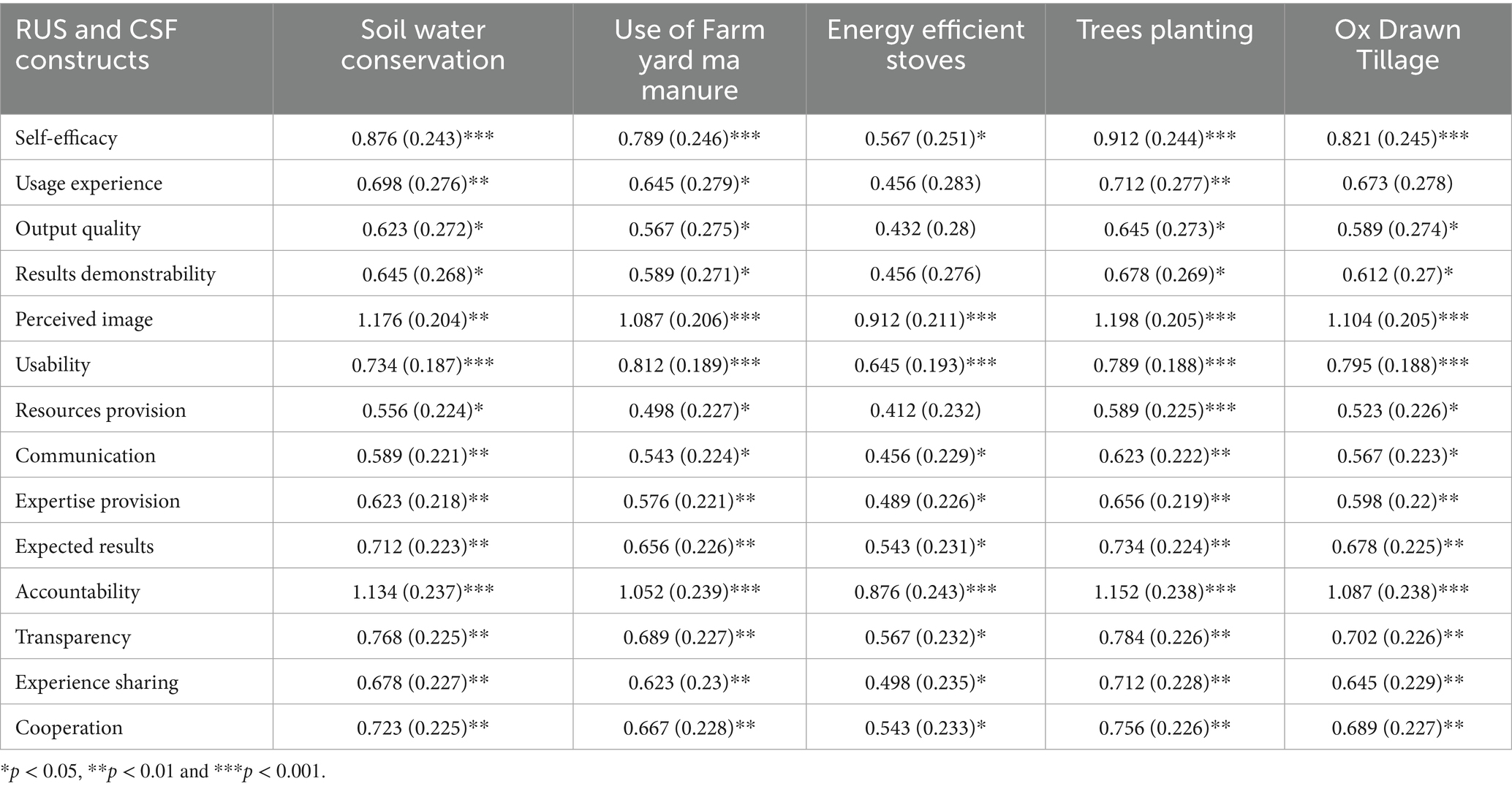
Table 6. Results of the multivariate ordered regression model for relative user satisfaction and critical success factors on sustainability of climate change adaptation practices.
The results demonstrate that the sustainability of CCA practices is strongly influenced by user motivation (RUS) and institutional enablers (CSFs). The high influence of perceived image suggests that practices providing social recognition are more sustainable, as households tend to maintain activities that enhance status and visibility within the community. This finding aligns with Ford et al. (2016), who reported that social prestige reinforces long-term commitment to agroforestry. Similarly, Nguyen et al. (2016) found that soil conservation practices persisted because they were associated with resilience and social value. Accountability and transparency also emerged as critical institutional factors. The strong effect of accountability reflects the importance of trust in community-led initiatives, consistent with Adger et al. (2009), who identified accountability as a foundation for collective action in adaptation. Likewise, transparency was found to foster community participation and ownership, reinforcing Meadow et al. (2015), who argue that open information sharing enhances adaptive governance. These results suggest that sustained adoption of CCA practices requires not only effective interventions but also governance mechanisms that ensure fairness and inclusivity.
The significant role of self-efficacy and usability underscores the importance of user confidence and ease of implementation. This supports the Technology Acceptance Model (TAM) and findings by Oguntuase et al. (2023) and Intergovernmental Panel on Climate Change (2022), which highlight perceived ease of use as a determinant of sustained technology adoption. Furthermore, the moderate effects of cooperation, experience sharing, and expected results emphasize the role of community networks and peer learning. Berrang-Ford et al. (2011) and Agyekum et al. (2024) similarly found that shared experiences and collective reinforcement enhance the persistence of adaptation practices.
However, the weak influence of subjective norms and individual performance suggests that collective and structural factors outweigh individual preferences in resource-constrained contexts. This finding resonates with community-driven adaptation approaches, where group cohesion and governance are stronger drivers than personal attitudes.
Generally, the findings highlight that sustainability is maximized when user satisfaction (RUS) and governance support (CSFs) intersect. Practices that deliver social recognition, foster accountability, and operate under transparent systems are more likely to persist, providing valuable insights for policymakers seeking to embed CCA practices into long-term community resilience strategies.
3.5 The probability of sustainability of climate change adaptation practices
Probability analysis was conducted to evaluate the likelihood of Relative User Satisfaction (RUS) and Critical Success Factors (CSFs) influencing the long-term high sustainability of Climate Change Adaptation (CCA) practices in Chamwino and Igunga, Tanzania. Marginal effect analysis revealed significant variations in the probability of sustainability across the practices. Perceived image, accountability, and transparency were the most influential predictors of sustainability, increasing the probability of continued implementation by 16.5–19.4%, 5 years after the end of project funding. Perceived image scored highest probability (dy/dx = 0.165–0.194, p < 0.001), followed by accountability (dy/dx = 0.153–0.182, p < 0.001), and transparency (dy/dx = 0.148–0.177, p < 0.001) on practices such as tree planting and soil water conservation.
Moderately significant predictors included self-efficacy, usability, and cooperation (dy/dx = 0.116–0.165, p < 0.01), which contributed strongly to the sustainability of soil-based practices and farmyard manure use. In contrast, subjective norms (dy/dx = 0.091–0.117, p < 0.05) and communication (dy/dx = 0.112–0.137, p < 0.05) had weaker effects, while individual performance (dy/dx = 0.069–0.090, p > 0.05) was non-significant. The results highlight that sustainability probabilities are primarily shaped by the interplay between user-centered drivers and institutional enablers. Perceived image strongly influenced adoption, indicating that practices tied to social recognition are more likely to persist. This supports Ford et al. (2016), who found that social prestige motivates long-term participation in agroforestry initiatives. Accountability and transparency also emerged as crucial, consistent with Adger et al. (2009) and Meadow et al. (2015), who argue that trust and open governance foster collective action and adaptive capacity. Moderately significant factors, such as self-efficacy and cooperation, highlight the role of user confidence and peer support in sustaining practices. Similar findings by Nguyen et al. (2016) and Agyekum et al. (2024) confirm that practices aligned with local knowledge and strengthened through cooperation exhibit higher continuity post-funding.
Conversely, the weak or non-significant role of subjective norms and individual performance suggests that collective and structural factors outweigh individual preferences in resource-constrained rural settings. The particularly low probability of sustainability for energy-efficient stoves mirrors observations by Mdoe and Kilawi (2024), who attribute poor uptake to cultural misalignment and maintenance costs (Table 7).
4 Conclusions and recommendations
4.1 Conclusion
This study explored the impact of Relative User Satisfaction (RUS) and Critical Success Factors (CSFs) on the post-funding sustainability of Climate Change Adaptation (CCA) practices. The findings highlight sustainability dependency on the interaction between user motivation and governance factors. Practices such as soil water conservation and tree planting showed the strongest sustainability, with user-related factors, such as perceived image, self-efficacy, and usability, being critical in encouraging continued implementation of practices after external funding. These results reaffirm the importance of social recognition, user confidence, and ease of use in driving sustained adoption, consistent with the Technology Acceptance Model. Governance-related factors such as accountability and transparency also played a key role, fostering trust, participation, and collective action within communities. Together, these drivers created conditions that supported the continuation of low-cost and culturally compatible practices. However, not all practices experienced the same level of success. Energy-efficient cooking stoves faced barriers related to maintenance, cost, and cultural preferences, underscoring the need for tailored interventions that address both technological and social challenges.
Overall, the study concludes that achieving sustainability in CCA practices requires a dual focus: enhancing user satisfaction to motivate adoption and strengthening governance systems to ensure transparency and accountability. Beyond Tanzania, these understandings have wider implications for other drought-prone regions in Sub-Saharan Africa, where communities face similar resource constraints, environmental pressures, and cultural dynamics. The emphasis on low-cost, user-friendly practices and robust governance structures offers a transferable framework for sustaining adaptation in contexts where donor support is temporary. By strengthening social recognition, building local capacity, and enhancing institutional trust, policymakers can improve the longevity of adaptation practices across diverse agro-ecological settings. Ultimately, the study demonstrates that sustainable climate resilience requires both community-driven participation and transparent governance mechanisms.
4.2 Recommendations
This study demonstrates that the sustainability of Climate Change Adaptation (CCA) practices depends on a combination of user-centered drivers, such as confidence, ease of use, and social recognition, alongside governance enablers, including accountability and transparency. To enhance the sustainability of CCA practices post-funding, the recommendations are proposed in short, medium and long terms. In the short term Ministry of Agriculture and Village Councils should strengthen accountability and transparency through community-level workshops, peer learning platforms, and the public recognition of successful adopters. Through sharing project outcomes and financial details it will help to motivate broader participation and build user confidence and trust for sustained participation (Agyekum et al., 2024). In the medium term, policymakers should strengthen accountability and transparency mechanisms through clear reporting systems and develop policy guidelines that integrate community feedback into program design. The Ministry of Agriculture’s Extension Services should implement targeted interventions, including subsidies and technical training, to address technological barriers and cultural challenges, thereby improving the usability and adoption of complex practices.
In the long term, national authorities, particularly the Vice President’s Office (Environment Division) and the National Environment Management Council (NEMC), should integrate CCA practices into national climate strategies and ensure consistent resource allocation to strengthen institutional capacity. Including these practices within existing governance structures will promote interrelated approaches and long-term resilience to climate impacts. Institutionalizing support through extension services will further ensure that local actors continue to receive technical and advisory assistance after project funding. By aligning community-level engagement, policy reforms, and national integration, this study offers a coherent roadmap for sustaining climate adaptation initiatives across drought-prone regions in Sub-Saharan Africa.
Data availability statement
The raw data supporting the conclusions of this article will be made available by the authors, without undue reservation.
Author contributions
EB: Writing – original draft, Writing – review & editing. KK: Supervision, Writing – review & editing. EN: Supervision, Writing – review & editing.
Funding
The author(s) declare that no financial support was received for the research and/or publication of this article.
Conflict of interest
The authors declare that the research was conducted in the absence of any commercial or financial relationships that could be construed as a potential conflict of interest.
Generative AI statement
The authors declare that no Gen AI was used in the creation of this manuscript.
Any alternative text (alt text) provided alongside figures in this article has been generated by Frontiers with the support of artificial intelligence and reasonable efforts have been made to ensure accuracy, including review by the authors wherever possible. If you identify any issues, please contact us.
Publisher’s note
All claims expressed in this article are solely those of the authors and do not necessarily represent those of their affiliated organizations, or those of the publisher, the editors and the reviewers. Any product that may be evaluated in this article, or claim that may be made by its manufacturer, is not guaranteed or endorsed by the publisher.
References
Adger, W. N., Dessai, S., Goulden, M., and Wreford, A. (2009). Are there social limits to adaptation to climate change? Clim. Chang. 93, 335–354. doi: 10.1007/s10584-008-9520-z
African Development Bank Group. (2025). Annual report 2024. African Development Bank Group. Available online at: https://www.afdb.org/en/documents/annual-report-2024.
Agrawala, S., Kramer, A. M., Prudent-Richard, G., Sainsbury, M., and Schreitter, V. (2012). Incorporating climate change impacts and adaptation in environmental impact assessments: opportunities and challenges. Clim. Dev. 4, 26–39. doi: 10.1080/17565529.2011.628791
Agyekum, E. O., Amankwaa, G., and Danso-Abbeam, G. (2024). Financial resources and climate-smart agriculture adoption in sub-Saharan Africa. J. Agric. Econ. 75, 123–139. doi: 10.1002/cli2.79
Ali, A., and Erenstein, O. (2016). Assessing farmer use of climate change adaptation practices and impacts on food security and poverty in Pakistan. Clim. Risk Manag. 16, 183–194. doi: 10.1016/j.crm.2016.12.001
Bagozzi, R. (2007). The legacy of the technology acceptance model and a proposal for a paradigm shift. J. Assoc. Inf. Syst. 8, 244–254. doi: 10.17705/1jais.00122
Berrang-Ford, L., Ford, J. D., and Paterson, J. (2011). Are we adapting to climate change? Glob. Environ. Chang. 21, 25–33. doi: 10.1016/j.gloenvcha.2010.09.012
Carlson, K., and McCormick, S. (2015). American adaptation: social factors affecting new developments to address climate change. Glob. Environ. Chang. 35, 360–367. doi: 10.1016/j.gloenvcha.2015.09.015
Davis, F. D. (1989). Perceived usefulness, perceived ease of use, and user acceptance of information technology. MIS Q. 13, 319–340. doi: 10.2307/249008
Dubash, N. K., and Jogesh, A. (2021). Communicating climate change findings from IPCC reports: insights from outreach events in India. Front. Commun. 6:708650. doi: 10.2139/ssrn.2474518
Field, C. B., and Barros, V. R. (2014). Climate change 2014–impacts, adaptation and vulnerability: Regional aspects. Cambridge, United Kingdom: Cambridge University Press.
Ford, J. D., Berrang-Ford, L., Bunce, A., and Pearce, T. (2016). The status of climate change adaptation in Africa and Asia. Reg. Environ. Chang. 15, 801–814. doi: 10.1038/nclimate2954
Githeko, A. K., Lindsay, S. W., Confalonieri, U. E., and Patz, J. A. (2000). Climate change and vector-borne diseases: a regional analysis. Bull. World Health Organ. 78, 1136–1147.
Hoque, E., Tatsuoka, F., and Sato, T. (1996). Measuring anisotropic elastic properties of sand using a large triaxial specimen. Geotech. Test. J. 19, 411–420. doi: 10.1520/GTJ10718J
Ika, L. A., Diallo, A., and Thuillier, D. (2012). Critical success factors for World Bank projects: an empirical investigation. Int. J. Proj. Manag. 30, 105–116. doi: 10.1016/j.ijproman.2011.03.005
Intergovernmental Panel on Climate Change (2022). Climate change and land: An IPCC special report on climate change, desertification, land degradation, sustainable land management, food security, and greenhouse gas fluxes in terrestrial ecosystems. Cambridge, United Kingdom: IPCC.
Khalifeh, A., Al-Adwan, A. S., Alrousan, M. K., Yaseen, H., Mathani, B., and Wahsheh, F. R. (2023). Exploring the nexus of sustainability and project success: a proposed framework for the software sector. Sustainability 15:15957. doi: 10.3390/su152215957
Klein, R. J. (2011). “Adaptation to climate change: more than technology” in Climate: Global change and local adaptation (Dordrecht: Springer Netherlands), 157–168.
Komba, C., and Muchapondwa, E. (2018). “Adaptation to climate change by smallholder farmers in Tanzania” in Gothenburg, Sweden: Routledge eBooks, 129–168.
Kunze, I., and Avelino, F. (2015). Social innovation and the global ecovillage movement. Ecol. Econ. 114, 243–253. doi: 10.1080/09654313.2019.1578339
Mahonge, C. (2013). Factors behind sustainability of activities in the post-project period in Matengo highlands in Tanzania. J. Environ. Sustain 3:5. doi: 10.4236/jmf.2013.31A019
McKelvey, R. D., and Zavoina, W. (1975). A statistical model for the analysis of ordinal level dependent variables. J. Math. Sociol. 4, 103–120. doi: 10.1080/0022250X.1975.9989847
Mdoe, N., and Kilawi, A. (2024). Post-funding sustainability of agricultural interventions in Tanzania. Afr. J. Agric. Res. 20, 45–58.
Meadow, A. M., Ferguson, D. B., Guido, Z., Horangic, A., Owen, G., and Wall, T. (2015). Moving toward the deliberate coproduction of climate science knowledge. Weather. Clim. Soc. 7, 179–191. doi: 10.1175/WCAS-D-14-00050.1
Mngomezulu, W. R., Machila, M., and Nyambe, I. A. (2023). Sustainability of agricultural practices post-project: a case study in southern Africa. Sustainability 15:9456. doi: 10.1371/journal.pgph.0002033
Mwandosya, M. J., Nyenzi, B. S., and Luhanga, M. L. (1998). The assessment of vulnerability and adaptation to climate change impacts in Tanzania. Dar-es-Salaam: Centre for Energy, Environment, Science and Technology (CEEST), 256.
Nguyen, T. P. L., Seddaiu, G., Virdis, S. G. P., and Roggero, P. P. (2016). Perceived barriers to climate change adaptation in the Mekong Delta. Environ. Manag. 57, 1083–1096. doi: 10.1080/03632415.2016.1162568
Oguntuase, O. J., Adebayo, O. A., and Afolabi, O. O. (2023). Predicting intention to adopt bioeconomy technologies for climate change mitigation. J. Clean. Prod. 415:137789.
Patz, J. A., Campbell-Lendrum, D., Holloway, T., and Foley, J. A. (2005). Impact of regional climate change on human health. Nature 438, 310–317. doi: 10.1038/nature04188
Perraillon, M. C., Konetzka, R. T., He, D., and Werner, R. M. (2019). Consumer response to composite ratings of nursing home quality. American J Health Econ 5, 165–190. doi: 10.1162/ajhe_a_00115
Pielke, R. A. Sr., Adegoke, J., BeltraáN-Przekurat, A., Hiemstra, C. A., Lin, J., Nair, U. S., et al. (2007). An overview of regional land-use and land-cover impacts on rainfall. Tellus Ser. B Chem. Phys. Meteorol. 59, 587–601. doi: 10.1016/j.agrformet.2006.06.012
Pinto, J. K., and Prescott, J. E. (1988). Variations in critical success factors over the stages in the project life cycle. J. Manage. 14, 5–18. doi: 10.1177/014920638801400102
Pinto, J. K., and Slevin, D. P. (1987). Critical factors in successful project implementation. IEEE Trans. Eng. Manag. 1, 22–27.
Pollnac, R. B., and Pomeroy, R. S. (2005). Factors influencing the sustainability of integrated coastal management projects in the Philippines and Indonesia. Ocean Coast. Manage. 48, 233–251. doi: 10.1016/j.ocecoaman.2005.04.003
Scarlett, L. (2011). “Climate adaptation: science and collaborative decision making” in Climate: Global change and local adaptation (Dordrecht: Springer Netherlands), 9–17.
Scheirer, M. A., and Dearing, J. W. (2011). An agenda for research on the sustainability of public health programs. Am. J. Public Health 101, 2059–2067. doi: 10.2105/AJPH.2011.300193
Serdeczny, O., Adams, S., Baarsch, F., Coumou, D., Robinson, A., Hare, W., et al. (2016). Climate change impacts in sub-Saharan Africa: from physical changes to their social repercussions. Reg. Environ. Chang. 17, 1585–1600. doi: 10.1007/s10113-015-0910-2
UNIQUE Forestry and Land Use (2020). Tanzania climate change strategy and master plan. Ministry of Environment: United Republic of Tanzania.
United Republic of Tanzania, URT. (2023). Tanzania state of the environment report. Vice President’s Office, Division of Environment. Available online at: https://tzdpg.or.tz/storage/2023/10/Tanzania-State-of-the-Environment-Report.pdf
Van Valkengoed, A. M., Steg, L., Perlaviciute, G., Schultz, P. W., Brosch, T., Gatersleben, B., et al. (2021). Theory enhances impact. Reply to:‘the case for impact-focused environmental psychology’. J. Environ. Psychol. 75:101597. doi: 10.1016/j.jenvp.2021.101597
Venkatesh, V., and Bala, H. (2008). Technology acceptance model 3 and a research agenda on interventions. Decis. Sci. 39, 273–315. doi: 10.1111/j.1540-5915.2008.00192.x
Keywords: agro-ecological zones, climate change adaptation practices, critical success factors, relative user satisfaction, sustainability
Citation: Baradyana EN, Kayunze KA and Ngowi EE (2025) Influence of relative user satisfaction and critical success factors on sustainability of climate change adaptation practices in Chamwino and Igunga, Tanzania. Front. Clim. 7:1671911. doi: 10.3389/fclim.2025.1671911
Edited by:
Rajiv Kumar Srivastava, Texas A&M University, United StatesReviewed by:
Tumaini Erasto Robert Mazengo, Tanzania Agricultural Research Institute (TARI), TanzaniaInoussa ZAGRE, Université des Sciences, des Techniques et des Technologies de Bamako, Mali
Copyright © 2025 Baradyana, Kayunze and Ngowi. This is an open-access article distributed under the terms of the Creative Commons Attribution License (CC BY). The use, distribution or reproduction in other forums is permitted, provided the original author(s) and the copyright owner(s) are credited and that the original publication in this journal is cited, in accordance with accepted academic practice. No use, distribution or reproduction is permitted which does not comply with these terms.
*Correspondence: Edson N. Baradyana, ZWRkZGJuQHlhaG9vLmNvbQ==
 Edson N. Baradyana
Edson N. Baradyana Kim A. Kayunze
Kim A. Kayunze Edwin. E. Ngowi2
Edwin. E. Ngowi2